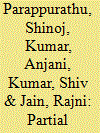|
|
|
Sort Order |
|
|
|
Items / Page
|
|
|
|
|
|
|
| Srl | Item |
| 1 |
ID:
130918


|
|
|
|
|
| Publication |
2014.
|
| Summary/Abstract |
A far-sighted food policy is essential to facilitate efficient functioning of food production and management systems, especially for a country like India where household level food security still remains elusive. In this context, reliable mechanisms for generating outlooks on key variables such as demand, supply, trade, prices, etc., of important food commodities forms an essential basis for planning. This paper explores the theoretical underpinnings as well as practical applications of the Cereal Outlook Model, a dynamic, partial-equilibrium model, developed by the authors with the specific purpose of generating future outlooks on major cereals in India. Based on this, projections as well as policy simulations on main demand and supply side variables of rice, wheat and maize were carried out for the period spanning 2011-2025. The model results indicate fast-growing trends in demand and supply of the three cereals considered. Though growth in demand would be sufficiently high due to growing per capita income, population and urbanisation; supply would keep pace owing to the emergence of new areas contributing towards incremental production. Consequently, the net trade of all three commodities would remain positive, though some signs of tapering off in net trade are expected in case of wheat and maize.
|
|
|
|
|
|
|
|
|
|
|
|
|
|
|
|
| 2 |
ID:
093885


|
|
|
|
|
| Publication |
2010.
|
| Summary/Abstract |
Supermarkets are often seen as marking the transition of food economies from traditional, informal, low-quality markets to more sophisticated, quality-based modes of food retailing. Focusing on Lusaka, Zambia's capital, this article critically assesses the claim that supermarkets 'revolutionize' food economies in Africa. While supermarkets have been successful in expanding their investment reach in Zambia, the article shows that they are not the only players in the food economy, neither are they the most dominant. The article argues for a more critical engagement with supermarkets and their role in urban Africa by drawing attention to contextual changes in the local food economy and factors in the regional political economy that drive/resist the process. It argues that the 'supermarket revolution myopia' sidelines evidence of other potentially transformative processes by which the transition of food economies is made possible, and shows that 'informal' food markets, made up of complex networks of interaction, present a considerable challenge to the claims that supermarkets transform food economies in urban Africa. Transitions in the regulation, governance, and physical infrastructure of these markets suggest that they are progressively more resilient and competitive, despite the growth of supermarkets.
|
|
|
|
|
|
|
|
|
|
|
|
|
|
|
|
| 3 |
ID:
130255


|
|
|
|
|
| Publication |
2014.
|
| Summary/Abstract |
This paper probes some of the global economic forces that have contributed to the ongoing precarious global food security situation, especially in the years since the 2007 to 2008 food crisis. Since the crisis hit at a time when global food production per capita was rising, it is important that policies addressing hunger incorporate dimensions beyond food production. There has been some acknowledgement of the role of global economic forces in the food crisis by global policymakers, but global food security initiatives still largely emphasize increased food production over other measures. The paper concludes that more needs to be done to ensure that the rules that govern the global economy--especially those regarding international trade, finance, and investment--do not work against the goal of food security.
|
|
|
|
|
|
|
|
|
|
|
|
|
|
|
|
|
|
|
|
|